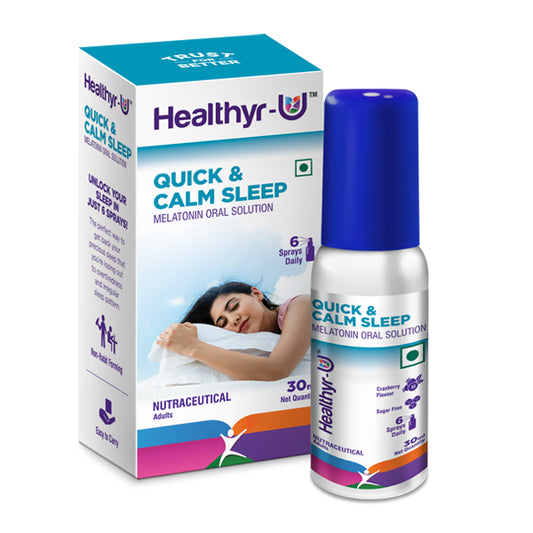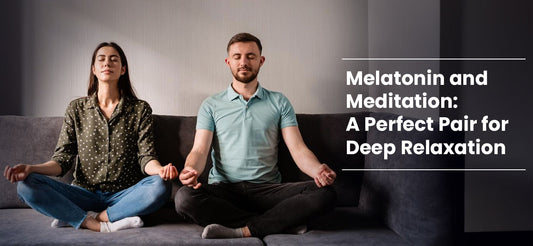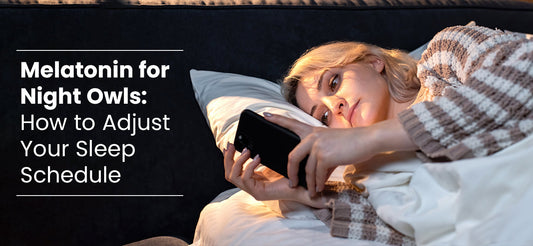Do you often find yourself not sleeping well at night? Tossing and turning, staring at the ceiling, or waking up feeling groggy instead of refreshed? If so, your melatonin production might be off balance.
Melatonin, often called the “sleep hormone,” is essential for regulating your sleep-wake cycle. However, melatonin and our lifestyle habits are closely linked. Your daily routine, exposure to light, diet, and activity levels all influence natural melatonin levels. While melatonin supplements can be helpful, making adjustments to your circadian lifestyle is the key to supporting your body's natural ability to produce melatonin.
Let us break down how your habits affect melatonin production and discover tips for good sleep that will help you fall asleep faster and wake up feeling refreshed.
Understanding Melatonin Production and the Sleep-Wake Cycle
Melatonin is produced by the pineal gland, a small gland in the brain that releases melatonin in response to darkness. It plays a crucial role in regulating your circadian rhythm, also known as the body's internal clock(1).
How Melatonin Works:
• Melatonin levels rise in the evening, signaling your body that it is time to wind down.
• Levels remain high during the night, ensuring restful sleep.
• Melatonin decreases in the morning, allowing you to wake up feeling alert.
However, various lifestyle habits can either support or disrupt this process, leading to poor sleep quality and daytime fatigue.
How Lifestyle Habits Impact Melatonin Production
1. Screen Time Before Bed Disrupts Melatonin Production
One of the biggest enemies of natural melatonin is blue light emitted from screens - phones, laptops, TVs, and tablets. Blue light suppresses melatonin production, tricking your brain into thinking it is still daytime(2).
It is advisable to limit screen time at least 1 hour before bed, use blue light filters or wear blue-light-blocking glasses in the evening.
2. Irregular Sleep Schedule Confuses Your Circadian Rhythm
A circadian lifestyle depends on consistency. Going to bed and waking up at different times each day confuses your internal clock, reducing melatonin production and making it harder to sleep(3).
The best way is to set a consistent sleep schedule, even on weekends. Try to wake up at the same time every morning to keep your body clock aligned.
3. Exposure to Artificial Light at Night Suppresses Natural Melatonin
Bright indoor lighting, especially LED and fluorescent lights, can interfere with melatonin and lifestyle habits by keeping the brain alert long after the sun has set.
4. Lack of Sunlight During the Day Reduces Melatonin Levels
Getting morning sunlight is essential for a balanced circadian lifestyle. Exposure to natural light during the day helps regulate melatonin production, ensuring proper sleep-wake cycles.(4)
5. Poor Diet Affects Sleep and Healthy Lifestyle Habits
Your diet plays a vital role in natural melatonin hormone production. Certain nutrients help your body produce melatonin, while others can disrupt sleep(5).
One must eat foods rich in tryptophan (bananas, nuts). Tryptophan converts into melatonin.
Magnesium-rich foods (spinach, almonds, dark chocolate) are also beneficial as magnesium relaxes muscles and promotes deep sleep. It is good to avoid caffeine and sugar at least 5-6 hours before bedtime to prevent sleep disturbances.
6. High Stress and Cortisol Levels Lower Melatonin
Chronic stress leads to elevated cortisol levels, which inhibit melatonin production and make it harder to fall asleep(6). If your mind is racing with worries at night, it could be interfering with your sleep and healthy lifestyle.
7. Lack of Physical Activity Leads to Poor Sleep
A sedentary lifestyle can disrupt melatonin and lifestyle habits, making it harder to fall asleep at night(7).
Low-impact activities like walking, stretching, or yoga can support natural melatonin levels, therefore, one should aim for at least 30 minutes of physical activity daily to improve sleep quality.
Tips for Good Sleep: How to Boost Melatonin Naturally
If you have not been sleeping well at night, adjusting your circadian lifestyle can help restore your natural sleep patterns.
Daily Habits to Improve Melatonin Production:
- Morning Sunlight – Start your day with natural light exposure.
-
Consistent Sleep Schedule – Sleep and wake up at the same time daily.
- Limit Caffeine & Sugar – Avoid stimulants in the evening.
- Screen-Free Evenings – Reduce blue light exposure before bed.
- Exercise Regularly – Stay active, but avoid late-night intense workouts.
- Create a Relaxing Bedtime Routine – Read, meditate, or listen to calming music.
- Consider Melatonin Supplements – Use as a short-term aid if needed.
By making these small yet effective changes, you can naturally increase melatonin production and enjoy deeper, more restorative sleep.
Conclusion
Melatonin and lifestyle habits are deeply connected. By following a circadian lifestyle, limiting screen exposure, eating the right foods, and maintaining a consistent sleep schedule, you can restore balance to your sleep and healthy lifestyle. While melatonin sprays and supplements can be a useful tool, the most effective way to improve sleep is to support your body’s natural ability to produce melatonin.
Start making these changes today, and soon, you will notice a significant improvement in your sleep quality, without relying on external sleep aids!
References
-
Kamfar, W. W., Khraiwesh, H. M., Ibrahim, M. O., Qadhi, A. H., Azhar, W. F., Ghafouri, K. J., Alhussain, M. H., Aldairi, A. F., AlShahrani, A. M., Alghannam, A. F., Abdulal, R. H., Al-Slaihat, A. H., Qutob, M. S., Elrggal, M. E., Ghaith, M. M., & Azzeh, F. S. (2024c). Comprehensive review of melatonin as a promising nutritional and nutraceutical supplement. Heliyon, 10(2), e24266. https://doi.org/10.1016/j.heliyon.2024.e24266
-
West, K. E., Jablonski, M. R., Warfield, B., Cecil, K. S., James, M., Ayers, M. A., Maida, J., Bowen, C., Sliney, D. H., Rollag, M. D., Hanifin, J. P., & Brainard, G. C. (2010). Blue light from light-emitting diodes elicits a dose-dependent suppression of melatonin in humans. Journal of Applied Physiology, 110(3), 619–626. https://doi.org/10.1152/japplphysiol.01413.2009
-
Phillips, A.J.K., Clerx, W.M., O’Brien, C.S. et al. Irregular sleep/wake patterns are associated with poorer academic performance and delayed circadian and sleep/wake timing. Sci Rep 7, 3216 (2017). https://doi.org/10.1038/s41598-017-03171-4
-
Choi, J. H., Lee, B., Lee, J. Y., Kim, C., Park, B., Kim, D. Y., Kim, H. J., & Park, D. (2020). Relationship between Sleep Duration, Sun Exposure, and Serum 25-Hydroxyvitamin D Status: A Cross-sectional Study. Scientific Reports, 10(1). https://doi.org/10.1038/s41598-020-61061-8
-
Meng, X., Li, Y., Li, S., Zhou, Y., Gan, R., Xu, D., & Li, H. (2017). Dietary sources and bioactivities of melatonin. Nutrients, 9(4), 367. https://doi.org/10.3390/nu9040367
-
Monteleone, P., Fuschino, A., Nolfe, G., & Maj, M. (1992). Temporal relationship between melatonin and cortisol responses to nighttime physical stress in humans. Psychoneuroendocrinology, 17(1), 81–86. https://doi.org/10.1016/0306-4530(92)90078-l
- Thrift, A. P., Xiao, L., Patel, S. R., Tworoger, S. S., McTiernan, A., & Duggan, C. (2014). Effects of physical activity on melatonin levels in previously sedentary men and women. Cancer Epidemiology Biomarkers & Prevention, 23(8), 1696–1699. https://doi.org/10.1158/1055-9965.epi-14-0299









